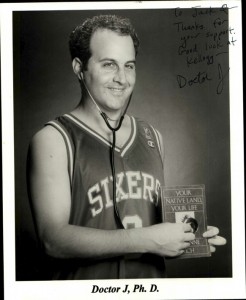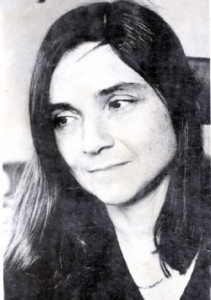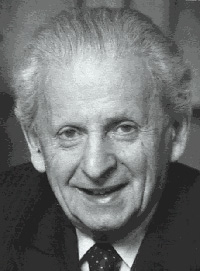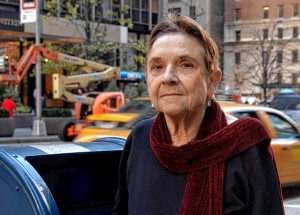All we can read is life. Death is invisible.
A yahrzeit candle belongs
to life. The sugar skulls
eaten on graves for the Day of the Dead
belong to life. To the living. The Kaddish is to the living,
the Day of the Dead, for the living.
Adrienne Rich, from “Living Memory” (1988)
Adrienne Rich, one of the major American poets of the 20th century as well as a leading feminist critic and writer, passed away at 83 this week. I spent most of my 20s writing my PhD thesis and other essays about her work, and while I have never worked so hard on any one project as I did trying to articulate my sense of Rich’s vision, when I moved on to other things after eight years I still had not really scratched the surface. Rich’s 60+ year career was characterized by amazing transformations: in her use of form, in her identification as straight or lesbian, in her progressively more expansive and authoritative rendering of the lives of varied people throughout the world. My take on Rich was pretty focused and waned quite a few years ago, so I just don’t have the generalist view that suits a true public appreciation. But I want to offer some brief thoughts on what compelled me to devote myself to understanding her work, and what that time in my life looks like in retrospect.
—–
When I turned up at Rutgers University for grad school in 1991, I really, really loved reading modern poetry and fiction and writing about it. I had limited experience of mediating this reading and explication through any kind of philosophical or theoretical context, which it turns out is kind of the job of an English professor. As these new criteria for talking about literature were dawning on me, I remember being moved for the first time by a poem that was both immediately accessible in a gut-punch way but also demanded to be framed by the broader political and theoretical context of its time. This 1980 poem was, in fact, called “Frame” and is in Rich’s major volume of selected poems, The Fact of a Doorframe. The poem that we read in a windowless basement seminar room recounts a young black woman being assaulted and arrested by the police after walking into a building to get warm while waiting for her bus. What makes the poem is the alternation of the straight third-person narration of this incident with the voice of a first-person witness, “standing all this time/just beyond the frame, trying to see.” At the poem’s end, after the woman has been thrown in jail and her fate silenced, Rich’s witnessing voice defies not only that silence but even the removal of the woman’s story into the past tense of fate, or a future tense of legalistic denials, and instead claims an immediate, current presence:
What I am telling you
is told by a white woman who they will say
was never there. I say I am there.
——-
Somebody told me back then that writing the PhD is a process of coming to understand why your chosen topic is in some sense autobiographical. That folk wisdom was probably true in ways that ended up being painful for me later on–but at the time, I felt grabbed in a powerful way by Rich’s effort to see and testify to the experiences of various people outside the privileges of whiteness or education or money she had enjoyed. And at the same time, I started reading a French Jewish philosopher named Emmanuel Levinas whose writings explored an ethics of ultimate, uncompromised (and maybe impossible) dedication to an Other. So in my dissertation I tried to define Rich’s “ethics of location,” in which she situates the varied groups of people to whom her poetry bears witness, in landscapes that speak to those people as well as to their strands of American history. I put this argument about Rich’s ethical commitments to those she wrote about into the context of Levinas’ philosophy of extreme commitment to the other.
——
Rather than get into whether that worked, or was a good idea, I think the best way to convey what was so compelling to me about Rich’s engagement of a reader/other in a historically specific location is the beginning of the last section of her best poem, “An Atlas of the Difficult World.” From her 1991 collection of the same name–which I dug out of a box (!) last night after I heard of Rich’s passing–this poem really links Rich to a powerful American tradition of evoking “the spirit of place,” to quote Rich’s earlier take on the theme, stretching back to folks like Walt Whitman, Hart Crane, Muriel Rukeyser, and others. What made this poem so moving for me was that it preserved Rich’s characteristically rigorous and unyielding eye for injustice, and her evocations of natural beauty and starkness in tension with those injustices, but with a magisterial sense of hope and possibility, even in such a fallen world and for privileged sinners like me. The poem’s concluding section is an amazing binding-together of Americans in their places, in their different readings of Rich’s poem, and in her attempt to render the truth of those readers’ lives:
I know you are reading this poem
late, before leaving your office
of the one intense yellow lamp-spot and the darkening window
in the lassitude of a building faded to quiet
long after rush-hour. I know you are reading this poem
standing up in a bookstore far from the ocean
on a grey day of early spring, faint flakes driven
across the plains’ enormous spaces around you.
…
I know you are reading this poem which is not in your language
guessing at some words while others keep you reading
and I want to know which words they are.
I know you are reading this poem listening for something, torn between bitterness and hope
turning back once again to the task you cannot refuse.
I know you are reading this poem because there is nothing left to read
there where you have landed, stripped as you are.
How I struggled as a young know-nothing to do justice to these lines. I think this stripped landing-place is what inspired me, even then, to bring in the ‘ol Levinasian absolutes of self and Other. This sense that Rich was evoking both the totally historical facts of the places we live in, and at the same time the way that life can make us feel we are staring out from those same places in a brutally new way, bereft of any support from whatever might have come before or might be hoped for to come. Rich’s power here is to generously convene this disparate collection of people in America and find a kind of community across their different, passionate engagement with these words.
—-
I spoke with Rich a couple of times in the five or six readings of hers I attended over the 90s and 00s. What was striking even then, in her early 60s, was how incredibly weakened she was by the rheumatoid arthritis that eventually overcame her. When I asked her once to inscribe her book to someone, she said she could only sign her name, that anything more would be too taxing for her hands. But whatever effort it took her to make it onto the stage and over to the podium, she always projected a fierce, controlled presence in reading her works, or those of others (Rumi comes to mind). Here’s a video from her reading at the Dodge Poetry Festival in New Jersey in maybe the late 90s that became part of a PBS series called “Poetry Everywhere.” I think I was too young to recognize how much of a physical struggle it must have been for her to work as hard as she did, decade after decade, through multiple operations and who knows what kind of daily discomfort. Meeting old lions like David Ferry and Richard Wilbur at Amherst last year really brought home what kind of focus, abstinence and self-will it takes to push yourself as a writer every day without fail. I can only add this dimension to my respect for Rich’s achievement.
—-
How is it that I am not writing this as the Professor of Rich Studies at a college

Would you let this man teach your kids about poetry? My headshot as "Dr. J" after finishing my PhD, 1997. I'm wearing the Julius Erving Sixers jersey and applying the stethoscope to Rich's book. Get it?
somewhere, clad entirely in black (or tweed–or black tweed!), in an office surrounded by iPad 3s displaying a live feed of tweets about Rich and other meta-literary figures? The reality is that Rich and Levinas together were two extremely big apples for a punk like me to bite, and after chewing for a while what I produced was just barely starting to be the kind of material that gets people hired in a brutally competitive job market. There were other dimensions to my exit from the profession. My advisor, a trim South African who had unflappably navigated the academic politics of both Derrida and Joyce, sat me down belatedly at the MLA meeting in San Francisco in 1999–a couple of years after I finished my PhD and was wondering why I couldn’t get a job interview–to observe that people who do single-author dissertations tend to be identified personally and politically with the authors they write about. So there was a bit of dissonance between the weird-ass straight white male person pictured above and the avatar of Rich’s lesbian feminist poetry and criticism that search committees might have been looking for. But honestly, it all worked out much for the best. I look at my friends who have succeeded in academia and they came out of the PhD phase with a much more focused, coherent, savvy take on what they were doing and why people needed to hear about it than I had. Ironically, the 12 years since then that I’ve spent in higher ed administration, particularly the communications roles I’ve had lately, have forced me out of my happy poetical garret and made me a much better spokesman for myself and my passions. And the bigger life picture is that academic success would likely have meant sitting somewhere with “faint flakes driven/across the plains’ enormous spaces around [me],” far from Amy, far from my parents, when we have needed to be together.
—-
Rich’s 1988 book Time’s Power is I think the under-recognized gem of her career, which has a sustained, at times mystical focus on memory that still strikes me deeply. The book ends with a poem called “Turning” that characteristically traces lives across a Western landscape, provides a frank and loving appraisal of Rich’s partner Michelle Cliff, and ends with a direct address to what seems to be a G-d-like presence. I will close with these brave final lines of the poem.
Adrienne Rich, 1929-2012. May her memory be a blessing.
Whatever you are that has tracked us this far,
I never thought you were on our side,
I only thought you did not judge us.
Yet as a cell might hallucinate
the eye–intent, impassioned–
behind the lens of the microscope
so I have thought of you,
whatever you are–a mindfulness–
whatever you are: the place beyond all places,
beyond boundaries, green lines,
wire-netted walls
the place beyond documents.
Unnameable by choice.
So why am I out here, trying
to read your name in the illegible air?
–vowel washed from a stone,
solitude of no absence,
forbidden face-to-face
–trying to hang these wraiths
of syllables, breath
without echo, why?




Yes to all of this.
I just found that picture the other day. You inscribed it, “Come back to the light!” Luckily there are many lights; we all found different ones.
Ain’t that the truth. I didn’t know that even then I was headed away from that light and into a different one.
Thanks for sharing this, Josh! I loved reading it and have so many excellent memories of that period.
Beautifully said. And I, too, found that photo of you this last weekend as I was hunting through folders and boxes.
Beautiful essay on many levels, Dr. J. Thanks for sharing these thoughts!
Beautifully and humbly said, Dr. J. I’m so glad you are writing about Adrienne Rich again. I feel blessed to spend my life with you. Keep on writing!